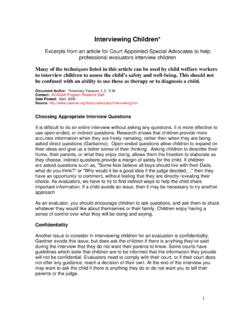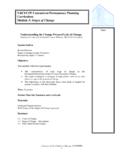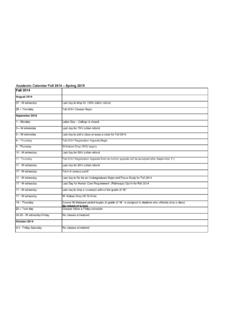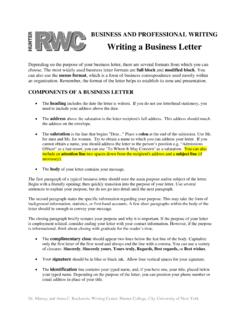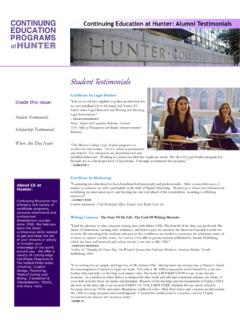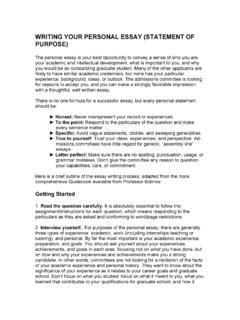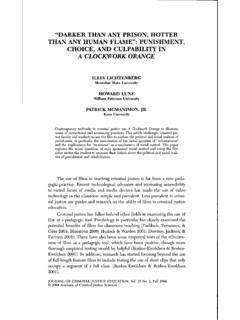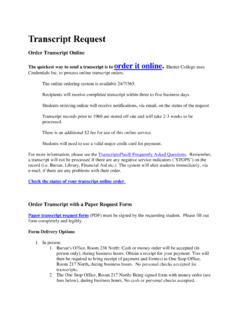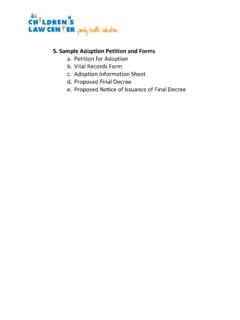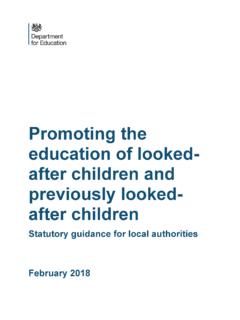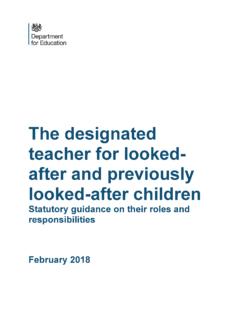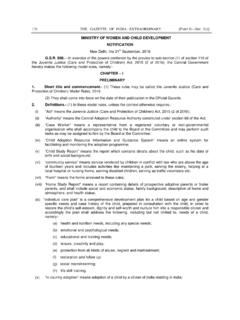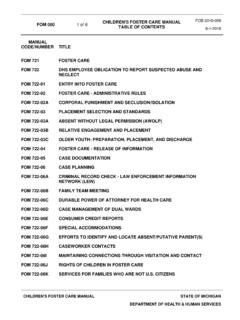Transcription of School-Age Children (7-9 years old)
1 Revised 5/1/09. School-Age Children (7-9 years old). Developmental Milestones Physical Have increased coordination and strength Enjoy using new skills, both gross and fine motor Are increasing in height and weight at steady rates Emotional/Social Increased ability to interact with peers Have more same-sex friends Increased ability to engage in competition Developing and testing values and beliefs that will guide present and future behaviors Has a strong group identity; increasingly defines self through peers Need to develop a sense of mastery and accomplishment based upon physical strength, self-control and school performance Intellectual/Cognitive By early elementary age, Children start logical thinking, which means that rather than accepting what they see as true, they begin to apply their personal knowledge and experience to a particular situation to determine whether it makes sense or not.
2 Temporal concepts greatly improve in this age range, as early elementary Children start to understand the idea of the passage of time, as well as day, date and time as concepts as opposed to as numbers. Most early elementary school aged Children have acquired the basic cognitive and linguistic concepts necessary to sufficiently communicate an abusive event. They can also copy adult speech patterns. As a result, it is easy to forget that Children in this age range are still not fully developed cognitively, emotionally, or linguistically. National Resource Center for Family-Centered Practice and Permanency Planning 1. th Hunter College School of Social Work 129 E. 79 Street New York, NY 10021. Tel. 212/452-7053 Fax.
3 212/452-7051 e-mail Revised 5/1/09. Suggested Well-Being and Permanency Questions for Birth Parents What was/is it like for you to care for your child at home? What has been the effect on your family of having this child placed? What did you expect it to be like? Help me understand what it has been like for you dealing with your child/ Children 's placement in foster care? What do you need to do so that you'll feel good about yourself and in control of your life again? Scaling Question: Thinking about the problems that led to your child's placement, on a scale of 1-10, with 10 meaning you have every confidence that these problems can be solved and 1 meaning you have no confidence at all, where would you put yourself today?
4 What would be different in your life if you were to make a change? On a scale of 1-10, with 10 being the most willing and 1 being not willing at all, how willing would you say you are to work to solve these problems? Miracle Question: Suppose that one night, while you were asleep, there was a miracle and all the problems that lead to the placement of your child were solved. How would you know they were solved? What would be different? Could you tell me something you like about parenting your child? What things are not so good about parenting him/her? What might happen if you don't change? How would changing your behavior affect your child and family? What is the permanency goal for your child? What do you think/feel about this?
5 What makes it okay; not okay? How have you been included in the family conferences/treatment team meetings? What are your responsibilities (things you do such as visits, treatment, getting your house ready for your child to return, etc.) in the case plan? Were you involved in helping to choose the alternative permanent plan (adoption or guardianship) and which family would care for your child? In order to have your child returned to you, what will be the first sign that things are moving in the right direction? What services do you need in order to care for your child? What do you think/feel about those services? Is your child is receiving any educational, medical and/or psychological services? Which ones?
6 How often? Do you think that these services are National Resource Center for Family-Centered Practice and Permanency Planning 2. th Hunter College School of Social Work 129 E. 79 Street New York, NY 10021. Tel. 212/452-7053 Fax. 212/452-7051 e-mail Revised 5/1/09. meeting this child's needs? Are there any other services that you think that this child needs? How have your visits been with your child/ Children ? What types of things do you do together during the visits? What could be done by you or others to improve visits? What services do you think your child/ Children will need in order to return home? To whom do you go when things are going well? To whom do you go if things aren't going too well? What is your greatest fear about your child returning home?
7 What is your greatest fear if your child does not return home? What things do you need to support your continued care of this child? Describe who your child is. What about your child is easiest and most pleasurable? What was the most difficult aspect of dealing with your child at home? What are the things about this child that will help him/her in the future? What will be harder for him/her? What were some of the adjustments you experienced in parenting this child? When your child was at home, what types of things did he/she like to do? When your child was at home, did she/he seek you out and accept your help when needed? When your child was at home, did he/she show warmth and affection across a range of interactions and with different people?
8 When your child was at home, who did they seek comfort from when hurt, frightened, or ill? What was your child's sleeping pattern at home? What was your child's eating pattern? Have you seen any weight changes since your child entered care? Does your child show preference for a particular adult? How easy is it to soothe your child when s/he is upset? National Resource Center for Family-Centered Practice and Permanency Planning 3. th Hunter College School of Social Work 129 E. 79 Street New York, NY 10021. Tel. 212/452-7053 Fax. 212/452-7051 e-mail Revised 5/1/09. Reviewing Safety Concerns with Birth Parents 9 Who provided supervision for your child when you were not home? How do you know this person? How old is this person?
9 Is there a way for your child to reach you when you are away from home? 9 How did your child get to and from school? 9 Did you know where your child was when s/he was not at school and was away from home? What are your rules for your child when not s/he is not at school or home? Is there a way for your child to reach you when s/he is away from home? 9 What are the names of your child's friends? Do you know how to reach them and their parents? 9 Does your child know your address and phone number? 9 What have you told your child to do if a stranger talks to him/her on the street? 9 Can you show me the family's list of phone numbers for your doctor, local hospital, police, fire department, poison control center and a friend or neighbor near the phone?
10 9 What is the emergency plan for your family in case of fire? Does your child know where smoke alarms and carbon monoxide alarms are located in your home? 9 If the worse case situation were to occur and your child was in danger of being abused again, does your child know what to do? Is there someone besides you available 24/7 the child can call for help? 9 Did this child have any serious injuries, either before or since coming into your care? How did you handle them? How is this condition being handled since foster care placement? How will you handle this condition when you child returns home? 9 Have you noticed any physical or emotional changes in your child? How has that changed your relationship with your child?
